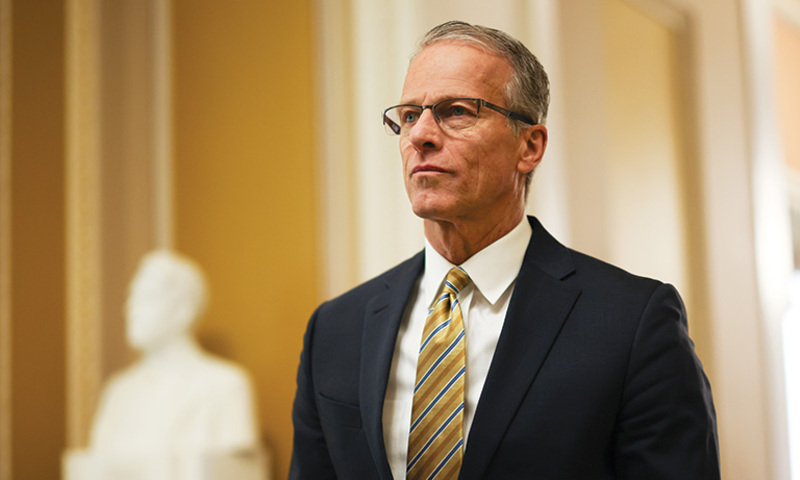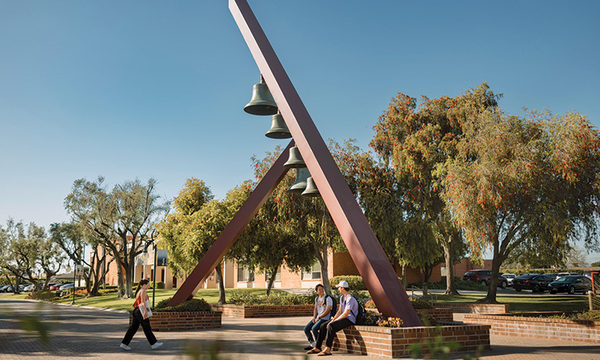When John Thune first told his parents he was considering running for Congress, his mother asked, ãCouldnãt you do something more reputable with your life?ã
ãMy older brothers, Bob and Rich, £ó¿üòÆóçd from Biola and then went into the ministry,ã Thune explains with a smile. ãMy mother was thrilled that they went in that direction, but the ministry wasnãt my calling.ã
Instead, John Thune found his calling in public service, first as a United States Congressman and then as a four-term United States Senator. In November of 2024, the Senate Republican Conference elected Thune as the Senate majority leader, one of the most powerful positions in the U.S. government.
Over his decades-long career in politics, Thune has made his mother proud. Heãs earned a reputation as a leader of character and integrity, and gained the trust and respect of his colleagues on both sides of the aisle. Given the divisive nature of todayãs political scene, that character, integrity, trust and respect will all be key as Thune plays a critical role in shaping the future of America.
ãMidwestern Niceã Meets Capitol Hill
Thune grew up in Murdo, South Dakota, an agricultural town with a population of less than 1,000.
A star high school athlete, Thuneãs interest in politics was sparked at a basketball game. After a game in which Thune sank five of six free throws, he met a spectator who pointed out, ãI noticed you missed one.ã That spectator was U.S. Rep. Jim Abdnor of South Dakota.
The representative and the basketball player kept in touch over the years. After earning his under£ó¿üòÆóç degree in business administration from Biola and his MBA from the University of South Dakota, Thune relocated to Washington, D.C., to accept a position in Congressman Abdnorãs office.
Over the next several years, Thune served at the Small Business Administration under an appointment from President Ronald Reagan; as the executive director of the South Dakota Republican Party; as the South Dakota state railroad director; and as executive director of the South Dakota Municipal League. In 1996, with a shoestring budget and the support of family and friends, Thune won his first of three terms in the U.S. House of Representatives. After narrowly losing his first Senate bid in 2002, he won his current Senate seat in dramatic fashion in 2004 ã unseating the incumbent Democratic Senate majority leader, Tom Daschle. Seeing his leadership in action, his colleagues elevated him to greater levels of responsibility over time, eventually landing him in the role of party whip, the second- ranking Republican senator, from 2019 to 2024.
When Sen. Mitch McConnell announced his decision in 2024 to step down after 18 years as the Senateãs leading Republican, Thune instantly emerged as a top contender. In November, Thune was elected Senate majority leader in a 29ã24 vote. Political pundits viewed him as a more traditional conservative choice than his opponents, Sen. John Cornyn of Texas and Sen. Rick Scott of Florida.
Thuneãs transparency, ability to listen and gift for building consensus has been recognized by both Republicans and Democrats. A profile of Thune in the April 7, 2025, issue of The New Yorker notes, ã[E]ven Democrats describe him as amicable and honest. A senior Democratic aide [said] that Thune is incapable of lying ãÎ and a Republican aide described Thune as ãhypercompetitive, but also Midwestern nice.ãã
That ãMidwestern niceã is modeled in one of Thuneãs favorite Scriptures, Proverbs 3:3ã4, which says: Let love and faithfulness never leave you; bind them around your neck, write them on the tablet of your heart. Then you will win favor and a good name in the sight of God and man.
ãThat is how I approach my work as majority leader,ã Thune tells Biola Magazine a few months into his new role. ãI want to stand up for the truth. I want to fight for the things I believe in. But I know you can do that in a spirit of kindness. You donãt have to be hostile to other people.
ãI have strong convictions. I feel strongly about my views of the world and my political partyãs views of the world,ã Thune continues. ãI want to move the arc of history in what I truly believe is the correct way for organizing societies and building a future for the next generation. But in trying to reach solutions, part of my job is to hear what the other side is saying and try to understand. My faith is very much a part of the way I approach that work.ã
The Biola Influence
Thune credits his Biola education with helping shape the perspective that guides him as he makes decisions that will impact not only the United States, but the world.
ãChristian education gives you a worldview that is not necessarily tethered to time, but more to eternity. Christian education raises your awareness that the things we do here are for a greater purpose, and hopefully, serve a higher cause,ã Thune says. ãThe culture of Biola, the overall atmosphere there, combined with the deep dive into the Scriptures thatãs required of every student, gives you a perspective that is more than just temporal. Itãs a perspective on the world and the things of the world ã including politics ã thatãs grounded and anchored in something more than just the daily news cycle.ã
Thune has maintained strong ties with Biola throughout his congressional career, including hosting students and staff on Capitol Hill and offering support to major university initiatives. He spoke at a fundraising gala for Biolaãs 100th anniversary in 2008 and served as honorary co-chair of the universityãs fundraising campaign in 2015, which raised more than $214 million for buildings, scholarships and other needs. During the height of the Covid-19 lockdowns, he joined a university- wide video call to offer words of encouragement and prayer for Biola faculty and staff.
Along the way, Thune has formed a close relationship with Biola President Barry H. Corey, who keeps the senator abreast of happenings at his alma mater. Corey and his wife, Paula, were guests at a reception honoring Thune on his first day as Senate majority leader.
In February 2025, Thune accepted an invitation from Corey to headline a Q&A session with the members of the National Association of Independent Colleges and Universities (NAICU), a national advocacy group for private higher education. Corey serves on the NAICU board.
ãI think John said ãyesã to the invitation because he knows the influence that colleges and universities have in America, because he is a product of a private Christian college, and because he wanted to honor Biola by being there,ã Corey says.
Thune addressed the crowd of 500 attendees, most of them presidents of private colleges, including secular, faith-based, liberal arts, research, large and small institutions. The senator fielded tough questions about the current administrationãs approach to federal funding for financial aid and other issues impacting higher education.
ãSen. Thune brought the temperature and the anxiety level in the room down. I heard afterward from numerous people, including people who are not aligned with him politically, that they found his remarks reassuring,ã Corey says.
ãJohn Thune is a leader who is able to thoughtfully engage in issues without being reactionary. In many ways, he represents private, faith-based higher education, and the fact that weãre needed in this nation now more than ever.ã
A Purpose-Driven Leader
Dave Peters, a retired Biola professor and former six-term mayor of La Mirada, California, describes himself as a ãlifelong, card-carrying, dues-paying member of the Democratic Party.ã And yet, when Thune decided to run for Congress, Peters told his former student, ãIãll campaign for you or against you, whichever you think will help you the most.ã
ãI know John Thune,ã Peters says. ãI know the Thune family and I know the values for which they stand. I could not know John that well and not be supportive of him. I trust Johnãs character, his background and what he stands for. I trust and depend on John to know when to speak up. I think what the country needs now is honesty and transparency, and someone who will make principled, reasonable decisions and choices. I have every confidence John Thune will do that.ã
Thune sees the opportunity to listen to others, to build consensus, and to make those principled, reasonable decisions and choices as his purpose.
ãThe first line of Rick Warrenãs book, The Purpose-Driven Life, is, ãItãs not about you.ã Iãve tried to keep that perspective,ã Thune says. ãAs a kid growing up, I never anticipated that Iãd be doing what Iãm doing today, but God opened those doors along the way. This job is the purpose Iãm here to serve. Seeing that bigger picture is important in trying to do the best job I can and honoring the Lord in doing it.ã
The Thune Playbook
As a Biola student, John Thune was a standout player on the Eagles basketball team. ãJohn was serious and responsible about his Christian life, being a strong student, and working hard in basketball practice, but there was also a lightness and good cheer about him and he had a great sense of humor,ã Dave Holmquist, longtime Biola head menãs basketball coach, recalls. ãJohnãs capacity to focus on important things, combined with how easily and often he laughed, made him well-liked by everyone. He was also demonstrably supportive of his teammates and he always put the team ahead of himself.ã ãMy family was heavily into athletics, and my dad was a Division I player at the University of Minnesota,ã Sen. Thune says. ãGrowing up, the message was always all about the team and making the team better, making the people around you better. That principle also applies to my role in the Senate today.ã
A Match Made at Biola
John Thuneãs wife, Kimberly (Weems, B.A. ã83) Thune, is also a native South Dakotan, but the two met for the first time on the Biola campus in La Mirada, California, when Kimberly transferred to the university as a junior.
ãI told my mother I was planning to focus on my studies, that I wasnãt interested in a dating relationship,ã Kimberly says. ãI met John my second day on campus. Letãs just say I didnãt keep that promise to my mom.ã
John and Kimberly were married in 1984. Kimberly also has experience on Capitol Hill; while John was working for Rep. Jim Abdnor, Kimberly worked as a legislative aide for Sen. Larry Pressler and with the Senate Foreign Relations Committee. Her career in public service also included handling special projects for late South Dakota Gov. George Mickelson. In recent years, Kimberly worked in public relations with Sanford Health Plan, one of the countryãs largest nonprofit, rural health systems. She currently serves as an ambassador for the Sanford Foundation.
The Thunes have two daughters and sons-in-law, Brittany and Luke Lindberg and Larissa and Scott Hargen, and six grandchildren. The Thunesã daughters were in elementary school when their father was first elected to Congress in 1996.
ãJohn and I considered it a privilege for our girls to grow up in this environment,ã Kimberly says. ãIt was not a ãnormalã life, and yes, they sometimes heard classmates say things like, ãI would never vote for Brittanyãs father.ã But it was an interesting life filled with amazing people. We were always very open with our daughters, we let them express their feelings, and we looked for teachable moments. I think the experiences and the conversations they had helped mold them into the confident people they are today.ã
Kimberly notes that todayãs political climate is much more divisive and volatile than in the early years of John Thuneãs service. Public criticism was once largely limited to attack ads on television; social media has ramped up the vitriol and made every moment in the public eye the potential subject of a post or a tweet.
ãWeãre scrutinized on every level,ã Kimberly says. ãWe work very hard to navigate that, to safeguard our family time and to maintain a sense of normalcy.ã
The Thunes spend almost every weekend in their native South Dakota, attending their grandchildrenãs ballet recitals and soccer games, where theyãve met many of Johnãs constituents. When the occasional negative article or social media post pops up, the Thunesã faith and a strong support system lessen the sting.
ãIn everything we do, our faith is first and foremost,ã Kimberly says. ãAnd we feel the power of prayer from so many people around us.
ãEvery decision John has ever made was made with a purpose. Itãs never been about John, itãs always been about what he could do for the kingdom,ã Kimberly continues. ãJohn is steadfast, and God has given him that steadfastness. As the majority leader, he knows he has to be thoughtful, listen to his colleaguesã point of view, and bring people together. Thereãs not a week that goes by that I donãt ask him, ãHow did you get that done?ãã
Photo credit: Kayla Bartkowski / Getty Images
 Biola University
Biola University



